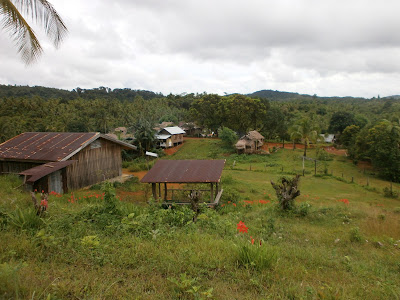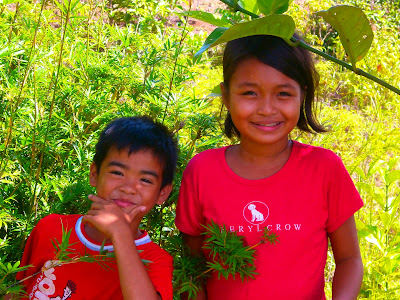Health Empowerment and Action in Leyte and Samar
...addressing the health concerns of the impoverished communities in the Eastern Visayas region.
Wednesday, July 18, 2012
Friday, April 6, 2012
General MacArthur, Eastern Samar
HEALS believes that the best way to be a people's advocate is to learn how they live. Part of its program then is to provide students and professionals the opportunity to integrate with communities. Last November 2011, a doctor and a nurse went to an interior barangay in the town of Gen. MacArthur, Eastern Samar for a two-week immersion.
There was no electricity in the community so that the nights were spent huddled around a small lamp telling stories or playing chess.
The people live on crops they planted. Most was on a subsistence level. Only when they have extra harvest do they get to trade their crops during "tabo" or market day.
Farming was primitive. There were no machines or modern method used.
The community was beautifully situated up a hill away from modern day living. Cellphone signal was difficult. One had to climb another small hill and use a stick to get a message sent.
The diet consisted of rootcrops harvested from our hosts' farm as staple food, and may include frogs or freshwater shrimps caught during the night. They could be cooked fried or with coconut milk.
Most of the population are children. The school offers only primary education, that is from Grades I to III. After finishing the three levels, they would either go to the town's central school or stop altogether due to difficulties finding a place to stay during school days or not having someone with them to guide them as their parents had to work in the farm.
Despite the poverty, the air was fresh, the water from a nearby spring was safe (a water system was set up there by another NGO) and the people generous.
As way of thanking the community and as part of our contribution to trying to improve their lives, health education on herbal medicines, common signs and symptoms as well as common diseases were given during two-week period.
Wednesday, January 25, 2012
About Us
ROOTS
HEALS was established in 2008 specifically to address the growing health needs of communities in the Eastern Visayas region . The founding members, advocates of community medicine, decided to form a group which would embody the primary health care approach – affordable, accessible, appropriate, and available health for all.
VISION
HEALS
envisions a society where poverty, hunger, inequity and oppression have been
eliminated; a society where basic needs, are recognized in policy and practice
as basic rights and not just a privilege of a few. Health
care shall be relevant, affordable, accessible and responsive to the needs of
the people. Health shall be a right and
a responsibility shared by health workers and the entire citizenry.
MISSION

 HEALS
shall support and assist village health organizations in the Eastern Visayas region in setting up
an alternative, relevant health care system at the community level.
HEALS
shall support and assist village health organizations in the Eastern Visayas region in setting up
an alternative, relevant health care system at the community level.
GOALS
1. To assist in the formation and establishment
of a people-managed health care system at the community level and ensure
mechanisms for access to all levels and types of health care services.
2.
To uphold health as a human right and promote the physical, mental, and
social well-being of individuals and
society.
STRATEGIES

1. Organizing and Networking
2. Advocacy and public information
3. Education and Training
4. Provision of basic health services
PROGRAMS AND SERVICES
1. Village-level Health Care
a. Basic Health Services and Education
b. Training of Volunteer Health Workers (health,
personal development, management and leadership skills)
c. Health Organizational Building (Regional
Health Network
2. Direct Health Services
a. Walk-in Clinic
b. Referral Network
c. Promotion of Herbal
and Complementary
Medicines
d. Medical missions
3. Community Health Human Resource Development
a. Student Immersion Program
b. Pool of Medical Volunteers
4. Networking
b. Resource Development
5. Advocacy, Public Information and Research
a. Data Banking and Information Systems
Development
i. Health Modules
and References
ii. Updates on
health news, indicators, and policies
b. Advocacy—Local and International
c. Research on Community Health/Traditional
Medicine
Subscribe to:
Comments (Atom)


































